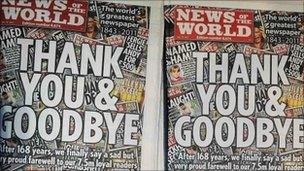What does News of the World hacking saga mean for NI?
- Published
- comments

As Rupert and James Murdoch and Rebekah Brooks give evidence to the House of Commons culture committee the focus will inevitably be on the personalities involved in the News of the World hacking saga. Who knew what and when?
It's gripping viewing, but seen from a regional perspective the bigger impact involves the process, not the individual players.
Most local and regional newspaper journalists have been protesting that they never indulged in the tactics now being exposed in London.
But as Lord Justice Leveson embarks on his hacking inquiry it seems certain that any new structure for press regulation will enmesh the local minnows as well as the metropolitan big fish.
The Press Complaints Commission dates back to 1991, and relies on the principle of self regulation. Journalists have always resisted any statutory government appointed body on the grounds that this would erode basic press freedom.
As recently as 2008, David Cameron was quoted as saying he had "no plans to change self-regulation".
But this was before the hacking scandal.
Lord Justice Leveson has been asked to make recommendations "for a new more effective policy and regulatory regime which supports the integrity and freedom of the press, the plurality of the media and its independence from government, while encouraging the highest ethical and professional standards".
The last senior legal figure to look at this terrain, David Calcutt QC, wrote a report which led to the creation of the voluntary Press Complains Commission.
But he made it clear that, should the PCC fail, government regulation remained an option. Indeed in 1993 he wrote a strongly critical review of the relatively new self-regulatory body, which concluded it should be replaced by a powerful statutory body.
Will Lord Justice Leveson be tempted down the same route, either recommending the creation of a new body or perhaps expanding the remit of Ofcom?
Ofcom is a government appointed regulator which oversees independent broadcasters, whilst the BBC Trust plays a similar role in relation to the BBC.
Broadcasting is not a devolved matter, and Ofcom has a regional office which earlier this year took the first and deputy first minister to task for the content of a radio advertisement promoting the Hillsborough deal on the devolution of justice.
If Lord Justice Leveson does decide to recommend the statutory regulation of newspapers and other print media, then he will also have to clarify whether that power should, like broadcasting, be reserved.
What role, if any, should Stormont play?
In Northern Ireland we live in a market where there's a high degree of penetration from media based in another jurisdiction.
Press freedom
In Dublin, the Press Council of Ireland follows a similar self-regulatory framework to the current UK Press Complaints Commission. If government regulation is introduced in the UK, there will be a marked difference between the regimes on either side of the border.
Defenders of press freedom will point out that regulating the print media is different to regulating broadcasting.
When it comes to the TV and radio there are so many slots on the spectrum - companies and corporations have long had to apply for licences to use those slots.
Whereas the right for someone to print what they want, provided it doesn't infringe the laws of defamation, has long been regarded as one of the cornerstones of a free democracy.
What happens if a newspaper refuses to cooperate with any new statutory body - will their freedom of expression be curtailed?
And given the profusion of blogs and twitter accounts, who should be defined as a publisher subject to any new framework? Despite the current concerns, does self regulation remain the lesser of the potential evils?
Lord Justice Leveson isn't expected to report for 12 months, so we won't even begin to have any answers to these questions until then.